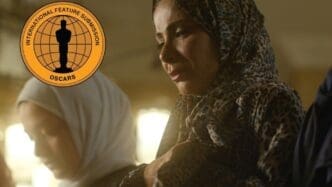Flight 404 takes us on a journey through the eyes of a woman grappling with her past. The drama unfolds with Mona Zaki playing a deeply layered character, Ghada, who finds herself connected with shadows from her former life. It’s a tale of struggle, religion, and self-discovery.
As Ghada embarks on her pilgrimage to Mecca, her past, filled with scandalous secrets, resurges. This Egyptian film taps into the intricacies of one’s attempt to escape from a turbulent history, cleverly wrapped within Mona Zaki’s nuanced performance. While the film occasionally loses momentum, it explores themes of faith, freedom, and identity.
The Past Resurfaces
Ghada’s past is not what it seems. She once lived a life shrouded in mystery, hidden behind the walls of wealth and power. Her career, intentionally obscured by Egyptian cinema’s censorious norms, included ties with a high-end escorting world. These revelations crawl out through a series of exasperating events when her mother, a recurring figure in her nightmares, resurfaces in her life.
A Prayer Disrupted
The tranquility of Ghada’s prayer is shattered by the ringing of a phone. It’s a call that forces her to confront the echoes of her earlier life. Her mother, embroiled in dubious dealings, disrupts Ghada’s present serenity. This intrusion hints at a theme: the past’s constant interruption of one’s current self.
Ghada’s life of devotion and professionalism clashes with her mother’s chaotic entanglements. This internal conflict is palpable as Ghada pauses her life of newly found discipline to address matters she wishes to forget. Her prayers become a motif, signifying her yearning for escape from her previous entanglements.
Unveiling Ghada’s Former Life
As Ghada prepares for her pilgrimage, the movie dances around revealing her secrets. She reconnects with past acquaintances, engaged in various criminal activities. The film’s evasion of explicit details speaks volumes about societal norms within Egyptian cinema.
Ghada’s return to old haunts runs parallel with her newer life under the veil. The film challenges whether societal pressures will allow her transformation or draw her back into her past life’s shadows. The struggle for liberty within societal constructs shapes a significant part of her journey.
Mona Zaki brings depth to Ghada by embodying a woman caught between two worlds, driven by the desire for personal transformation. However, the film’s approach leaves many questions unanswered, leaving audiences pondering her true intentions and struggles.The exploration of identity and choice stands at the film’s core.
A Woman’s Struggle
Ghada’s complex world becomes more tangled when her mother faces an accident. This unexpected event becomes a pivot for further chaos in her life. She dives deeper into the web of her past acquaintances, desperately seeking help even from disreputable sources.
This desperate quest to balance her current life with haunting memories illustrates the story’s intricate character dynamics. As the plot unfolds, Ghada must decide if she will continue reaching towards redemption or be pulled back into her past dynamics entirely.
Her decision-making process reveals significant insights into her psyche. Each encounter with a former associate complicates her resolve to move forward, challenging her path to a free and uninfluenced life.
Returning to Old Haunts
In a twist of fate, Ghada is seen at one of her old haunts by a mysterious client. This encounter challenges her resolve, testing whether she’s truly moved on from her previous identity. Her struggle between a past tainted with controversy and a future rooted in newfound beliefs presents a gripping narrative.
The social fabric around her bursts with expectations and whispers, making it hard for Ghada to carve out a new identity. Mona Zaki captures this contradiction beautifully, leaving viewers to ponder the fragility of change.
Meticulous Performances
Mona Zaki’s portrayal of Ghada is nothing less than mesmerizing. She infuses the character with a reality that strikes a chord. The film’s aesthetic choices, however, often constrain this powerful portrayal, yet she delivers moments that resonate with strength and vulnerability.
Her performance raises ‘Flight 404’ beyond its narrative constraints, revealing Ghada’s spiritual dilemma and existential entrapments. Zaki’s efforts underscore her struggle against a society that refuses her the potential for change.
Narrative Challenges
While the film attempts to spotlight Ghada’s personal growth against societal pressures, the storytelling struggles to maintain focus. The fragmented narrative often obscures critical insights into Ghada’s journey, leaving viewers wanting more clarity.
The dialogue-heavy scenes at times hinder the film’s potential, overshadowing the subtle moments of introspection that make the story compelling.
Despite these narrative hurdles, ‘Flight 404’ offers isolated moments where Zaki’s prowess as an actor reveals the intricacies of personal struggle, balancing faith and autonomy in a world reluctant to change.
Themes and Symbolism
The movie occasionally hints at profound themes. The symbolism is embedded within Ghada’s adherence to prayer and routine, which act as a tether to her newfound path. Yet, these subtleties are often eclipsed by on-the-nose storytelling.
Disparate sequences fill the screen, attempting to convey dramatic turns through implicit storytelling, often losing impact without immediately clear narratives.
Final Thoughts
‘Flight 404’ leaves audiences reflecting on the profoundness of personal growth. Amidst its jumbled narrative, the film’s ambition to highlight personal evolution against societal confines remains evident.
The narrative encourages viewers to consider their own paths and the choices that define them, echoing Ghada’s tumultuous journey.
Ultimately, the film stands as a testament to the complexities of life’s unexpected turns and the human capacity for change, despite society’s reluctance to embrace it.
Although ‘Flight 404’ stumbles in its narrative execution, the film bravely tackles themes of identity and societal expectation. It poses questions about personal growth and morality.
Mona Zaki’s performance breathes life into the movie, ensuring that viewers remain captivated by her portrayal of Ghada, a woman caught between past and present.
Source: Variety







